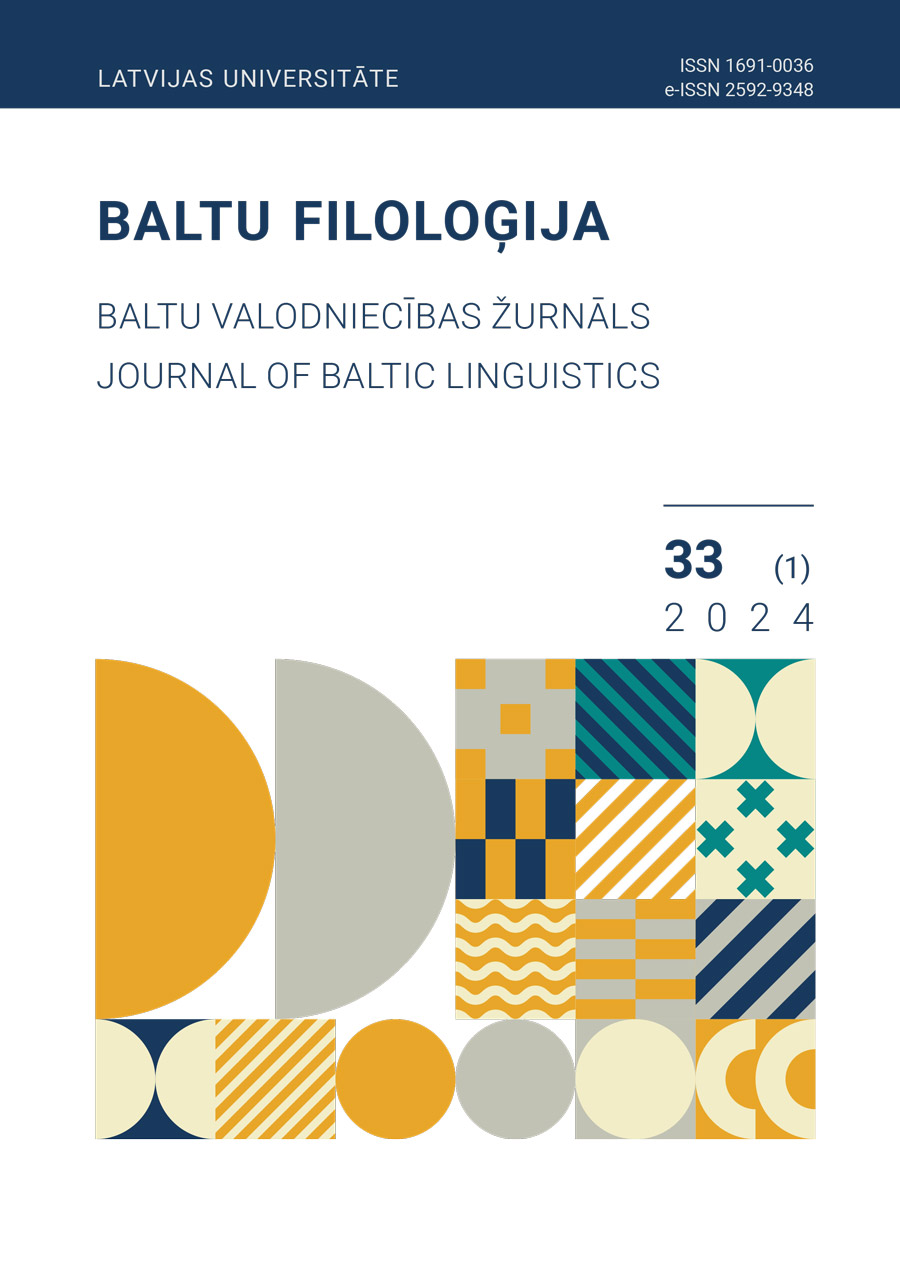The Appellative Latv. žīgurs and the Onym Žīguri in a Geolinguistic and Etymological Perspective
DOI:
https://doi.org/10.22364/bf.33.1.03Keywords:
Latv. žīgurs, Latvian sub-dialects, lexicographic sources, historical sources, distribution, originAbstract
This article aims to trace one of the Latvian names for the sparrow – the lexeme žīgurs – from the perspectives of distribution and etymology. In the latter half of the 20th century, the appellative žīgurs was found within a compact area in northeastern Vidzeme and northern Latgale (see Map 1). The geographical linguistic information from 19th- and 20th-century lexicographic sources expands this distribution area towards the west and southwest. The lexeme žīgurs is included in the dictionaries of Jakob Lange and Karl Christian Ulmann. However, in J. Lange’s dictionary, this word denotes a stork, while in K. C. Ulmann’s dictionary, it refers to a sparrow.
The onym Žīgurs (also in plural as Žīguri) similarly indicates the extended distribution area of the appellative žīgurs. The onym Sigur appears in the Vidzeme plow review documents from 1638 in six locations. In the 20th and 21st centuries, it has been used as the name of villages, homesteads, taverns, lakes, fields, meadows, and other places. It is also known as a surname.
Linguists have been interested in the etymology of the lexeme žīgurs since the second half of the 19th century. The first to propose a hypothesis about the connection between the Prussian singuris ‘goldfinch’ and the Latvian žīgurs was F. Fick. However, the distribution area of the lexeme žīgurs is not typical for Prussian loanwords. J. Endzelīns does not separately address the etymology of the appellative žīgurs but, in relation to the standard Latvian word for sparrow, zvirbulis, suggests that it could have originated from the contamination of the root virb- (Polish wróbel, Russian воробей) with words containing z- or ž- (Latvian zvĩgurs, zvipuris, žīgurs) (ME IV 777).
References
Bezzenberger, Adalbert. 1874. Thesaurus linguae prussicae: Der preussische Vocabelvorrath, soweit derselbe bis jetzt ermittelt worden ist, nebst Zugabe einer Sammlung urkundlich beglaubigter Localnamen, gesichtet und zusammengestellt von G. H. F. Nesselmann. Berlin: Ferd. Dümmlers Verlagsbuchhandlung, 1873. Göttingische gelehrte Anzeigen unter der Aufsicht der Königl. Gessellscahft der Wissenschaften. Stück 39, 1221–1250.
Būga, Kazimieras. 1961. Rinktiniai raštai, 3. tomas. Vilnius: Valstybinė politinės ir mokslinės literatūros leidykla.
Dunsdorfs, Edgars. 1941. Vidzemes 1638. gada arklu revīzija. 4. sēj. Reģistrs. Rīga: Latvijas Vēstures institūta apgādiens.
EH = Endzelīns, Jānis, Hauzenberga, Edīte. Papildinājumi un labojumi K. Mǖlenbacha „Latviešu valodas vārdnīcai” Rīga: Kultūras fonds, 1934–1938; 1–2, Rīga: Grāmatu apgāds, 1946.
Endzelīns, Jānis. 1943. Senprūšu valoda. Ievads, gramatika un leksika. Rīga: Universitātes apgāds.
Fischer, Jacob Benjamin. 1778. Versuch einer Naturgeschichte von Livland, entworfen von J. L. Fischer. Lepzig: verlegts Johann Gottlob Immanuel Breitkopf.
Lange. Jacob. 1772. Vollſtängiges Lettiſches Lexicon, ſamt angezeigten verſchiedenen Provinzialdialekten in Lief- und Kurland. Schloß Ober=Pahlen.
LD = Barons, Krišjānis; Visendorfs, Heinrihs. Latvju Dainas: 1. sēj. Jelgava: H. I. Draviņ-Dravnieka ģeneralkomisija, 1894; 2.–6. sēj. Pēterburga: Ķeizariskās Zinibu Akademijas spiestava, 1903–1915.
LVDA 1999 = Latviešu valodas dialektu atlants. Leksika. Rīga: Zinātne, 1999.
LVDAP 1954 = Latviešu valodas dialektu atlanta materiālu vākšanas programa. Rīga: Latvijas. PSR Zinātņu akadēmijas izdevniecība, 1954.
Mažiulis, Vytautas. 1966. Prūsų kalbos paminklai. Parengė Vytautas Mažiulis. Vilnius: Mintis.
Mažiulis, Vytautas. 1997. Prūsų kalbos etimologijos žodynas. 4 tomas. Vilnius: Mokslo ir enciklopedijų leidybos institutas.
ME = Kārļa Mǖlenbacha Latviešu valodas vārdnīca 1–4. Rediģējis, papildinājis, turpinājis Jānis Endzelīns. Rīga: Izglītības ministrija, 1923–1932.
Nesselmann, Georg Heinrich Ferdinand. 1873. Thesaurus linguae prussicae: Der preussische Vocabelvorrath, soweit derselbe bis jetzt ermittelt worden ist, nebst Zugabe einer Sammlung urkundlich beglaubigter Localnamen, gesichtet und zusammengestellt von G. H. F. Nesselmann. Berlin: Ferd. Dümmlers Verlagsbuchhandlung.
Stender, Gotthard Friedrich. 1789. Lettisches Lexikon. In zween Theilen abgefasset, und den Liebhabern der lettischen Litterature gewidmet von Gotthard Friedrich Stender. Lettisches Wörter- und Namen-Lexikon. Erster Theil. Mitau: J. F. Steffenhagen.
Šmits, Pēteris. 1941. Latviešu tautas ticējumi, 4. sējums. Sakrājis un sakārtojis prof. P. Šmits. Rīga: Latviešu folkloras krātuves izdevums.
Töppen, Max Pollux. 1867. Einige Reste der altpreussischen Sprache nebst antiquarischen Bemerkungen von Dr. m. Töppen. Altpreußische Monatsschrift. Der neuen Preußischen Provinzial-Blätter vierte Folge. Herausgegeben von Rudolf Reicke und Ernst Wickert. Vierter Band. Königsberg: Th. Theile’s Buchhandlung, 136–156.
Ulmann, Carl Christian. 1872. Lettiʃches Wörterbuch. Erʃter Theil. Lettiʃch-deutʃches Wörterbuch von Biʃchof Dr. Carl Chriʃtian Ulmann. Riga.
Ulmann, Carl Christian; Brasche, Gustav. 1880. Lettiſches Wörterbuch von Ulmann und Braſche. Zweiter Theil. Deutʃch-lettiʃches Wörterbuch mit Zugrundelegung des von Biſchof Dr. Carl Chriʃtian Ulmann zurükgelaʃʃenen Manuʃcriptes bearbeitet von Guʃtav Braʃche, Paʃtor emer. Riga u. Leipzig: Verlag von H. Brutzer & Co.
Vilcāne, Antonija. 2024. Latgaļi. Nacionālā enciklopēdija. https://enciklopedija.lv/skirklis/147057
Vilde, Pēteris Ernsts. 1991. Latviešu Ārste jeb īsa mācība no tām Vājībām un no šās ``Zemes Zālēm, ar kuŗām Cilvēkus un Lopus var ārstēt un izzāļot. Jākoba Langes 1768. gada tulkojuma teksts. Rīga: Zvaigzne.
Zariņš, Pēteris. 1971. Žugure, žigure, starkis, štorks. Dzeive 01.01.1971
Downloads
Published
Issue
Section
License
Copyright (c) 2024 University of Latvia

This work is licensed under a Creative Commons Attribution-NonCommercial 4.0 International License.


